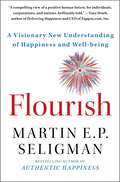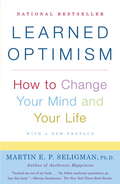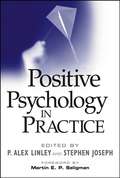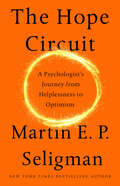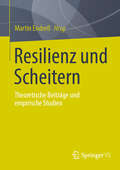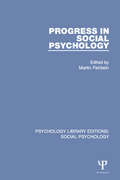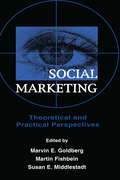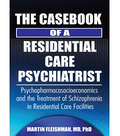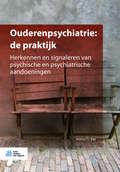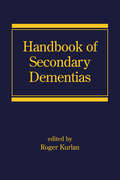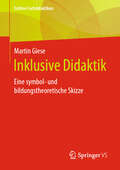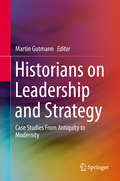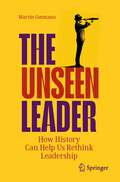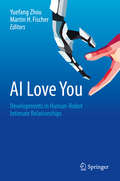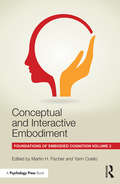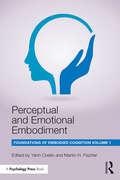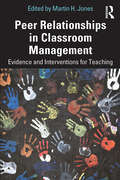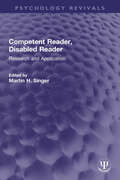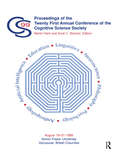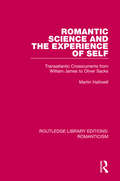- Table View
- List View
Flourish: A Visionary New Understanding of Happiness and Well-being
by Martin E. SeligmanFrom the bestselling author of Learned Optimism and Authentic Happiness comes “a relentlessly optimistic guidebook on finding and securing individual happiness” (Kirkus Reviews).With this unprecedented promise, internationally esteemed psychologist Martin Seligman begins Flourish, his first book in ten years—and the first to present his dynamic new concept of what well-being really is. Traditionally, the goal of psychology has been to relieve human suffering, but the goal of the Positive Psychology movement, which Dr. Seligman has led for fifteen years, is different—it&’s about actually raising the bar for the human condition. Flourish builds on Dr. Seligman&’s game-changing work on optimism, motivation, and character to show how to get the most out of life, unveiling an electrifying new theory of what makes a good life—for individuals, for communities, and for nations. In a fascinating evolution of thought and practice, Flourish refines what Positive Psychology is all about. While certainly a part of well-being, happiness alone doesn&’t give life meaning. Seligman now asks, What is it that enables you to cultivate your talents, to build deep, lasting relationships with others, to feel pleasure, and to contribute meaningfully to the world? In a word, what is it that allows you to flourish? &“Well-being&” takes the stage front and center, and Happiness (or Positive Emotion) becomes one of the five pillars of Positive Psychology, along with Engagement, Relationships, Meaning, and Accomplishment—or PERMA, the permanent building blocks for a life of profound fulfillment. Thought-provoking in its implications for education, economics, therapy, medicine, and public policy—the very fabric of society—Flourish tells inspiring stories of Positive Psychology in action, including how the entire U.S. Army is now trained in emotional resilience; how innovative schools can educate for fulfillment in life and not just for workplace success; and how corporations can improve performance at the same time as they raise employee well-being. With interactive exercises to help readers explore their own attitudes and aims, Flourish is a watershed in the understanding of happiness as well as a tool for getting the most out of life. On the cutting edge of a science that has changed millions of lives, Dr. Seligman now creates the ultimate extension and capstone of his bestselling classics, Authentic Happiness and Learned Optimism.
Learned Optimism: How to Change Your Mind and Your Life
by Martin E. SeligmanKnown as the father of the new science of positive psychology, Martin E.P. Seligman draws on more than twenty years of clinical research to demonstrate how optimism enhances the quality of life, and how anyone can learn to practice it. Offering many simple techniques, Dr. Seligman explains how to break an "I-give-up" habit, develop a more constructive explanatory style for interpreting your behavior, and experience the benefits of a more positive interior dialogue. These skills can help break up depression, boost your immune system, better develop your potential, and make you happier. With generous additional advice on how to encourage optimistic behavior at school, at work and in children, Learned Optimism is both profound and practical--and valuable for every phase of life.
Positive Psychology in Practice
by Martin E. Seligman Stephen Joseph P. Alex LinleyA thorough and up-to-date guide to putting positive psychology into practiceFrom the Foreword: "This volume is the cutting edge of positive psychology and the emblem of its future."-Martin E. P. Seligman, Ph.D., Fox Leadership Professor of Psychology, University of Pennsylvania, and author of Authentic HappinessPositive psychology is an exciting new orientation in the field, going beyond psychology's traditional focus on illness and pathology to look at areas like well-being and fulfillment. While the larger question of optimal human functioning is hardly new - Aristotle addressed it in his treatises on eudaimonia - positive psychology offers a common language on this subject to professionals working in a variety of subdisciplines and practices. Applicable in many settings and relevant for individuals, groups, organizations, communities, and societies, positive psychology is a genuinely integrative approach to professional practice.Positive Psychology in Practice fills the need for a broad, comprehensive, and state-of-the-art reference for this burgeoning new perspective. Cutting across traditional lines of thinking in psychology, this resource bridges theory, research, and applications to offer valuable information to a wide range of professionals and students in the social and behavioral sciences.A group of major international contributors covers: The applied positive psychology perspective Historical and philosophical foundations Values and choices in pursuit of the good life Lifestyle practices for health and well-being Methods and processes for teaching and learning Positive psychology at workThe best and most thorough treatment of this cutting-edge discipline, Positive Psychology in Practice is an essential resource for understanding this important new theory and applying its principles to all areas of professional practice.
The Hope Circuit: A Psychologist's Journey from Helplessness to Optimism
by Martin E. SeligmanOne of the most influential living psychologists looks at the history of his life and discipline, and paints a much brighter future for everyone.When Martin E. P. Seligman first encountered psychology in the 1960s, the field was devoted to eliminating misery: it was the science of how past trauma creates present symptoms. Today, thanks in large part to Seligman's Positive Psychology movement, it is ever more focused not on what cripples life, but on what makes life worth living--with profound consequences for our mental health.In this wise and eloquent memoir, spanning the most transformative years in the history of modern psychology, Seligman recounts how he learned to study optimism--including a life-changing conversation with his five-year-old daughter. He tells the human stories behind some of his major findings, like CAVE, an analytical tool that predicts election outcomes (with shocking accuracy) based on the language used in campaign speeches, the international spread of Positive Education, the launch of the US Army's huge resilience program, and the canonical studies that birthed the theory of learned helplessness--which he now reveals was incorrect. And he writes at length for the first time about his own battles with depression at a young age.In The Hope Circuit, Seligman makes a compelling and deeply personal case for the importance of virtues like hope, gratitude, and wisdom for our mental health. You will walk away from this book not just educated but deeply enriched.
Assessing Foreign Language Students' Spoken Proficiency: Stakeholder Perspectives on Assessment Innovation (Educational Linguistics #26)
by Martin EastThis book presents an indepth study of assessment innovation and its impact on teaching and learning. The context is New Zealand, and the focus is additional languages other than English and the recent introduction of a radical new assessment of students' spoken proficiency, called interact. The book crosses the traditional theoretical and methodological boundaries associated with language testing research, which focuses on assessment performance, and presents an alternative approach where stakeholders become the centre of interest. It advances our understanding of how assessment innovation impacts on two key groups - teachers and students in schools - based on data collected from a substantial twoyear research project. It presents an account of these stakeholders' perceptions of the validity and usefulness of the new assessment in comparison with the more traditional test that it has replaced. Assessing Foreign Language Students' Spoken Proficiency makes an outstanding and original contribution to the field of second and foreign language teaching, providing a theory and research-based account of the development of a learner-centred approach to oral proficiency assessment. It is an important resource for teachers and teacher educators as well as assessment and curriculum specialists worldwide. It deserves to be widely read.
Resilienz und Scheitern: Theoretische Beiträge und empirische Studien
by Martin EndreßWill man über Resilienz sprechen, darf man über Scheitern nicht schweigen. Das gilt gerade dann, wenn mit einem reflexiven Resilienzbegriff der prozessuale Zuschnitt dieser Beobachtungsperspektive für die Deutung sozio-historischen Geschehens stark gemacht werden soll. Solchermaßen kommen nicht nur Konstellationen eines produktiven Scheiterns in den Blick, sondern ebenso die komplexe Mehrebenenstruktur von Resilienzprozessen, die das Scheitern auf einer mit dem Gelingen auf anderen Ebenen sozialer Prozesse zusammendenken lassen. Zum Themenfeld "Resilienz und Scheitern" versammelt der Band historische und sozialwissenschaftliche Beiträge, die das ambivalente Verhältnis von Resilienzprozessen und Diagnosen des Scheiterns in theoretisch-konzeptioneller Hinsicht ausloten und in ausgewählten historischen Fallstudien vom 13. bis ins 20. Jahrhundert hinein empirisch veranschaulichen. Die Beiträge schreiben damit die Bemühungen der Trierer Forschungsgruppe "Resilienz - Gesellschaftliche Umbruchphasen im Dialog zwischen Mediävistik und Soziologie" fort, ein kritisch reflektiertes Resilienzkonzept für historische und sozialwissenschaftliche Analysen fruchtbar zu machen.
Motivating Humans: Goals, Emotions, and Personal Agency Beliefs
by Martin Eugene FordThis volume provides a precise and comprehensive description of human motivation. Drawing on psychology, education and management, Ford integrates classic and contemporary motivation theory into a unified framework - Motivational Systems Theory - from which he derives 17 principles for motivating people. The book provides concrete examples throughout and includes a chapter on practical applications such as: promoting social responsibility in young people; increasing motivation for learning and school achievement; increasing work productivity and job satisfaction; and helping people lead emotionally healthy lives.
Historical and Philosophical Foundations of Psychology
by Martin FarrellThis textbook connects the big ideas and key thinkers of psychology and philosophy in a clear and cohesive theoretical narrative. Students are led to understand the relations between different schools of thought, and to connect the various thinkers, theories and facts in psychology's history. Focusing on the major ideas that have reoccurred throughout history, such as the mind-body problem and the role of the mind in our experience, Martin Farrell shows how specific thinkers have explored the same ideas, but in different ways, leading to distinct schools of thought. The coherent narrative enables students to see the bigger picture, through which the historical and conceptual roots of psychology can be easily understood.
Therapeutische Arrangements im Maßregelvollzug: Studien zur Leerstellengrammatik und den Bezugsproblemen in der forensischen Psychiatrie
by Werner Vogd Martin FeißtAuf Basis von Feldforschungen und Interviews in 6 forensischen Kliniken werden die Herausforderungen der Therapie und Resozialisierung im Maßregelvollzug untersucht. Es werden grundlegende Dilemmata der Therapie unter Zwang herausgearbeitet und typische Probleme und Chancen aufgezeigt, die mit Versuch der Normalisierung der Patienten einhergehen. Es wird eine systemische Analyseperspektive gewählt, die den Blick sowohl auf die konkreten Beziehungen wie auch das organisationale Gefüge und seiner gesellschaftlichen Einbettung lenkt.
Progress in Social Psychology: Volume 1 (Psychology Library Editions: Social Psychology)
by Martin FishbeinOriginally published in 1980, this title was the first of a new monograph series in social psychology. The editor presents a format for showing the progress of social psychology as a viable, exciting and relevant discipline. <P><P>The papers contained in this volume represent progress in theory and method as well as in basic and applied research. In addition, recognising that not all social psychology is produced by people who label themselves as ‘social psychologists’ the volume contains the contributions of scholars who are best known for their work in other areas.
Social Marketing: Theoretical and Practical Perspectives
by Martin Fishbein Marvin E. Goldberg Susan E. MiddlestadtSocial Marketing: marketing in the service of societal problems. Does this approach represent dangerous social engineering, or is it the best hope we have to treat what are often regarded as intransigent problems? For both academics and practitioners involved with social marketing, the domain remains in its infancy. Programs and approaches are being developed and implemented by practitioners; academics are defining "what it is," "where it comes from," and "where it is going." This book incorporates many of the presentations made at the "Role of Advertising in Social Marketing" Conference sponsored by the Society for Consumer Psychology. Professionals from academia, government, and non-government organizations address a highly diverse and interesting set of societal concerns ranging from organ donation to violence in sports, from efforts to promote safe sex and family planning to better understand cigarette smokers and their perceptions. Are marketing's "four Ps"--product, price, place, and promotion--enough to help solve these problems, or does social marketing at the end of the 1990s need to call on other Ps, such as political persuasion? This volume thoughtfully addresses theoretical and empirical issues challenging academics and practitioners alike to find out how to borrow the best of marketing for application in social marketing.
The Casebook of a Residential Care Psychiatrist: Psychopharmacosocioeconomics and the Treatment of Schizophrenia in Residential Care Facilities
by Martin FleishmanDiscover an alternative realm of psychiatry-without offices or couches! The Casebook of a Residential Care Psychiatrist: Psychopharmacosocioeconomics and the Treatment of Schizophrenia in Residential Care Facilities addresses the problems involved in the onsite treatment of mentally ill patients in residential care facilities. This book is the first to identify the need for psychiatrists to be available to individuals in such facilities as adult homes, community care homes, transitional living facilities, and rest homes. This vital resource also contains specific recommendations as to how these visits should be conducted with regard to frequency, duration, space, and the types of Medicare procedure codes to utilize. In The Casebook of a Residential Care Psychiatrist, Dr. Fleishman uses his 40 years of experience as a psychiatrist to show you the ins and outs of practicing psychiatry in residential facilities. The book also discusses the profound changes psychiatric drugs have produced in the social, economic, and legal arenas. Using anecdotes, personal stories, and actual documents from Dr. Fleishman&’s files, this book provides you with a wealth of knowledge not found anywhere else. With this book, you&’ll learn more about: time-saving interview/assessment techniques the importance of psychopharmacology in residential care and how it has changed the practice of psychiatry Dr. Fleishman&’s method for appropriately creating and using progress notes and other records during treatment ways to work with other members of the residential facility professional community-including psychologists, social workers, pharmacists, and administrators-to make everyone&’s job easier the best ways to control paperwork obligations the impact that federal, state, and local government agencies have had on mental health spending, services, and practitioners In The Casebook of a Residential Care Psychiatrist, you will find wisdom, knowledge, and advice along with case studies, tables and examples. While focused on psychiatry and schizophrenia, this book will be of interest to mental health workers, long-term caregivers, and residential facility administrators as well as psychiatrists and psychologists.
Mediation im Erbrecht
by Martin Fries Ralf DeutlmoserDieses Open-Access Buch erläutert in einer praxisnahen Darstellung, wie sich Erbstreitigkeiten durch eine Mediation zügig und für alle Beteiligten sehr befriedigend beilegen lassen. Auf der Grundlage ihrer jahrelangen Mediationspraxis berichten die Verfasser, warum sich erbrechtliche Konflikte in besonderer Weise für pragmatische Kompromisse eignen und wie es gelingt, die Erben auf diesen Weg zu bringen. Das Buch versteht sich als Ratgeber für anwaltliche Berater, Mediatoren sowie für Erblasser und Erben und gibt vielfältige Hilfestellungen für kluges Konfliktmanagement in der Gestaltung und Abwicklung der Vermögensnachfolge.
Ouderenpsychiatrie: Herkennen en signaleren van psychische en psychiatrische aandoeningen
by Martin G. KatDit boek leert zorgprofessionals die werken met ouderen, om psychiatrische en psychische aandoeningen bij hun cliënten te herkennen en signaleren. Zij kunnen dankzij dit boek vroege adequate behandeling mogelijk maken.Dit boek koppelt praktijkvoorbeelden aan de beschreven aandoeningen bij ouderen. Professionals die werken met ouderen, zoals verzorgenden, (wijk)verpleegkundigen, POH’s en casemanagers.
Handbook of Secondary Dementias (Neurological Disease and Therapy)
by Martin GardnerExamining infant through geriatric patients, this guide compiles expert recommendations and research on the wide array of conditions that can secondarily impair cognition or behavior. Supplying key clinical, diagnostic, and therapeutic information, this reference analyzes topics including cerebrovascular disease, infectious processes, multiple scle
Inklusive Didaktik: Eine symbol- und bildungstheoretische Skizze (Edition Fachdidaktiken)
by Martin GieseMit diesem Buch legt der Autor den Entwurf einer symboltheoretischen und erfahrungsorientierten Fundierung des Inklusionsdiskurses sensu Cassirer vor. Vor dem Hintergrund der Annahme, dass sich der Inklusionsdiskurs sowohl in der Behindertenpädagogik als auch in der allgemeinen Erziehungswissenschaft durch ein explizites Theoriedefizit auszeichnet, verfolgt dieser Band das Ziel, eine inklusive schulische Didaktik besser als bisher theoretisch zu legitimieren.Der InhaltEinleitung • Zum Forschungsstand im Inklusionsdiskurs • Semiotische und bildungstheoretische Überlegungen – Eine kulturanthropologische Skizze • Didaktische Perspektiven • FazitDer AutorPD Dr. Martin Giese ist an der Deutschen Blindenstudienanstalt e.V. in Marburg sowie als Privatdozent am Institut für Rehabilitationswissenschaften der Humboldt-Universität zu Berlin tätig.
Historians on Leadership and Strategy: Case Studies From Antiquity to Modernity
by Martin GutmannThis book examines the well-covered subject of leadership from a unique perspective: history's vast catalogue of leadership successes and failures. Through a collection of highly compelling case studies spanning two millennia, it looks beyond the classic leadership parable of men in military or political crises and shows that successful leadership cannot be reduced to simplistic formulae.Written by experts in the field and based on rigorous research, each case provides a rich and compelling account that is accessible to a wide audience, from students to managers. Rather than serving as a vehicle for advancing a particular theory of leadership, each case invites readers to reflect, debate and extract their own insights.
The Unseen Leader: How History Can Help Us Rethink Leadership
by Martin GutmannThe Unseen Leader delivers one simple but immensely powerful point: we need to radically rethink how we discuss leadership. In this book, American historian Martin Gutmann passionately challenges the received wisdom that history's great leaders were individuals with a proclivity for action and brash words. Drawing on extensive historical scholarship and contemporary leadership theory, Gutmann delves into the journeys of four unknown or misunderstood leaders who achieved remarkable successes in vastly different environments—the Polar North, the deserts of Arabia, the sugar plantations of the Caribbean, and Second World War London. What emerges is an entirely new narrative on leadership. Contrary to the perception of heroic protagonists forging ahead boldly, history's truly great leaders were often precisely those who didn't need to generate excessive noise or activity. Instead, they skillfully minimized dramatic circumstances. Their stories challenge our present-day conception of leadership and can inspire the leaders of tomorrow.
AI Love You: Developments in Human-Robot Intimate Relationships
by Martin H. Fischer Yuefang ZhouUsing an interdisciplinary approach, this book explores the emerging topics and rapid technological developments of robotics and artificial intelligence through the lens of the evolving role of sex robots, and how they should best be designed to serve human needs. An international panel of authors provides the most up-to-date, evidence-based empirical research on the potential sexual applications of artificial intelligence. Early chapters discuss the objections to sexual activity with robots while also providing a counterargument to each objection. Subsequent chapters present the implications of robot sex as well as the security and data privacy issues associated with sexual interactions with artificial intelligence. The book concludes with a chapter highlighting the importance of a scientific, multidisciplinary approach to the study of human - robot sexuality. Topics featured in this book include: The Sexual Interaction Illusion Model. The personal companion system, Harmony, designed by Realbotix™. An exposition of the challenges of personal data control and protection when dealing with artificial intelligence. The current and future technological possibilities of projecting three-dimensional holograms. Expert discussion notes from an international workshop on the topic. AI Love You will be of interest to academic researchers in psychology, robotics, ethics, medical science, sociology, gender studies as well as clinicians, policy makers, and the business sector.
Conceptual and Interactive Embodiment: Foundations of Embodied Cognition Volume 2
by Martin H. Fischer Yann CoelloThis two-volume set provides a comprehensive overview of the multidisciplinary field of Embodied Cognition. With contributions from internationally acknowledged researchers from a variety of fields, Foundations of Embodied Cognition reveals how intelligent behaviour emerges from the interplay between brain, body and environment. Drawing on the most recent theoretical and empirical findings in embodied cognition, Volume 2 Conceptual and Interactive Embodiment is divided into four distinct parts, bringing together a number of influential perspectives and new ideas. Part one introduces the field of embodied language processing, before part two presents recent developments in our understanding of embodied conceptual understanding. The final two parts look at the applied nature of embodied cognition, exploring the embodied nature of social co-ordination as well as the emerging field of artificial embodiment. Building on the idea that knowledge acquisition, retention and retrieval are intimately interconnected with sensory and motor processes, Foundations of Embodied Cognition is a landmark publication in the field. It will be of great interest to researchers and advanced students from across the cognitive sciences, including those specialising in psychology, neuroscience, intelligent systems and robotics, philosophy, linguistics and anthropology.
Perceptual and Emotional Embodiment: Foundations of Embodied Cognition Volume 1
by Martin H. Fischer Yann CoelloThis two-volume set provides a comprehensive overview of the multidisciplinary field of Embodied Cognition. With contributions from internationally acknowledged researchers from a variety of fields, Foundations of Embodied Cognition reveals how intelligent behaviour emerges from the interplay between brain, body and environment. Covering early research and emerging trends in embodied cognition, Volume 1 Perceptual and Emotional Embodiment is divided into four distinct parts, bringing together a number of influential perspectives and new ideas. Part one opens the volume with an overview of theoretical perspectives and the neural basis of embodiment, before part two considers body representation and its links with action. Part three examines how actions constrain perception of the environment, and part four explores how emotions can be shaped and structured by the body and its activity. Building on the idea that knowledge acquisition, retention and retrieval are intimately interconnected with sensory and motor processes, Foundations of Embodied Cognition is a landmark publication in the field. It will be of great interest to researchers and advanced students from across the cognitive sciences, including those specialising in psychology, neuroscience, intelligent systems and robotics, philosophy, linguistics and anthropology.
Peer Relationships in Classroom Management: Evidence and Interventions for Teaching
by Martin H. JonesPeer Relationships in Classroom Management offers pragmatic, empirically validated guidance to teachers in training on issues pertaining to students’ interpersonal relationships. Concepts such as bullying, popularity, and online friendships are ubiquitous in today’s schools, but what kinds of scientific and pedagogical knowledge can support teachers navigating students’ complex lives? Using real-world examples and case studies, this book helps preservice educators to enhance their knowledge of classroom management by focusing on the interpersonal relationships in their schools. Each chapter includes an accessible approach to understanding the social motives in student’s peer interactions inside school, and how to best intervene when these social interactions become detrimental to learning or cause negative interpersonal interactions.
Competent Reader, Disabled Reader: Research and Application (Psychology Revivals)
by Martin H. SingerIn the past frustration with experimental reports had caused educators to dismiss the entire reading research enterprise. Originally published in 1982, this book attempts to abstract those experimental results relevant to developing effective reading programs. The book concentrates on the more mechanical aspects of reading skill such as visual discrimination ability, visual and auditory memory, visual-to-phonetic translation skills, and attentional strategies. These skills it is argued, account for the major proportion of variance in reading ability. The research on both competent and incompetent reading indicates the special importance of such skills to reading. The book contains three sections. Section I reviews the experimental evidence on competent reading. The review highlights consistent threads of evidence and provides a description of the competent reader’s strategies for analyzing text. Section II reviews research on poor reading. This section evaluates the concept of dyslexia and stresses that reading problems are not uniform. Section III maintains that the information about competent reading strategies and the impediments to acquiring those strategies should guide educators in evaluating instructional materials and facilitate the diagnosis of reading failure. Today it can be read in its historical context.
Proceedings of the Twenty-first Annual Conference of the Cognitive Science Society
by Martin Hahn; Scott C. StonessThis book presents the complete collection of peer-reviewed presentations at the 1999 Cognitive Science Society meeting, including papers, poster abstracts, and descriptions of conference symposia. For students and researchers in all areas of cognitive science.
Romantic Science and the Experience of Self: Transatlantic Crosscurrents from William James to Oliver Sacks (Routledge Library Editions: Romanticism #Vol. 2)
by Martin HalliwellFirst published in 1999, this engaging interdisciplinary study of romantic science focuses on the work of five influential figures in twentieth-century transatlantic intellectual history. In this book, Martin Halliwell constructs an innovative tradition of romantic science by indicating points of theoretical and historical intersection in the thought of William James (American philosopher); Otto Rank (Austrian psychoanalyst); Ludwig Binswanger (Swiss psychiatrist); Erik Erikson (Danish/German psychologist); and Oliver Sacks (British neurologist). Beginning with the ferment of intellectual activity in late eighteenth-century German Romanticism, Halliwell argues that only with William James’ theory of pragmatism early in the twentieth century did romantic science become a viable counter-tradition to strictly empirical science. Stimulated by debates over rival models of consciousness and renewed interest in theories of the self, Halliwell reveals that in their challenge to Freud’s adoption of ideas from nineteenth-century natural science, these thinkers have enlarged the possibilities of romantic science for bridging the perceived gulf between the arts and sciences.
